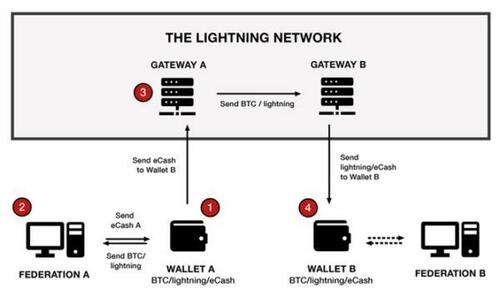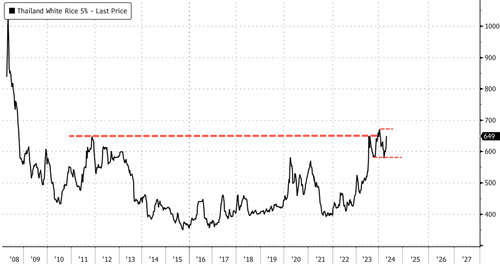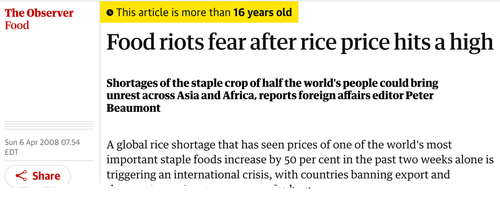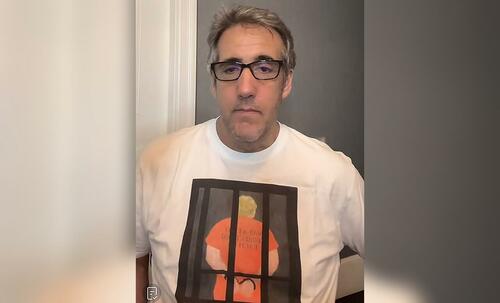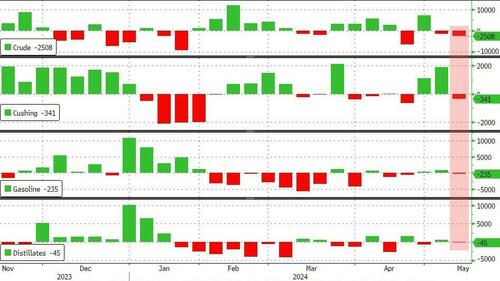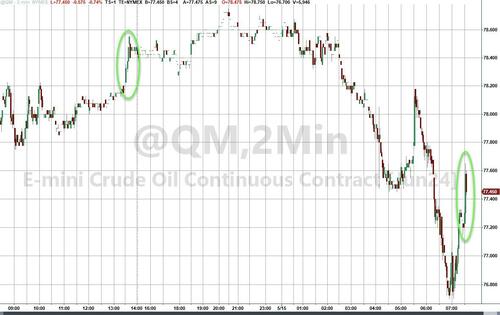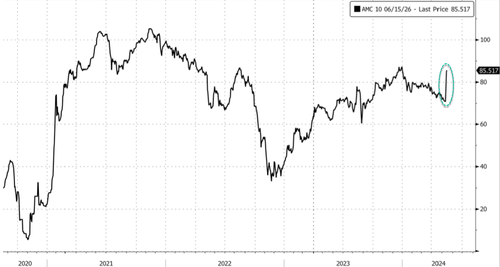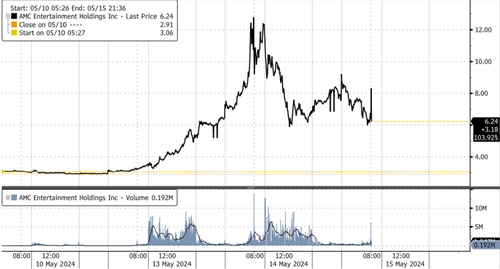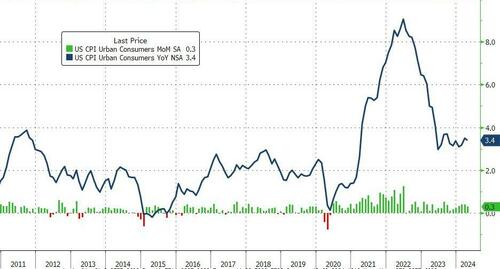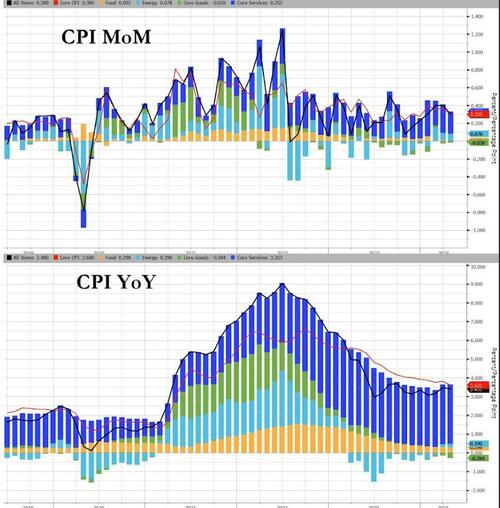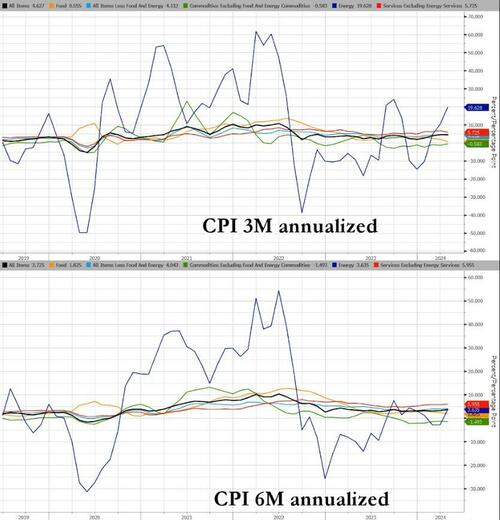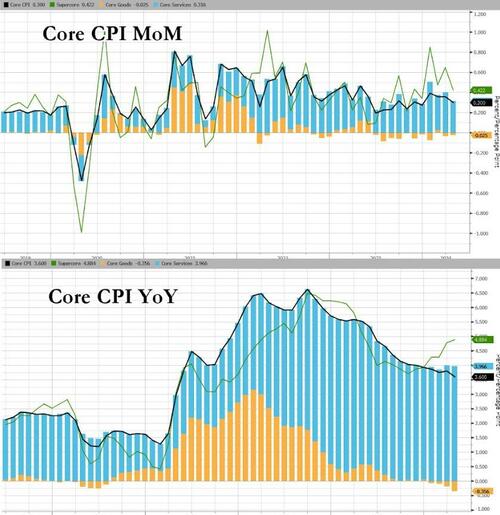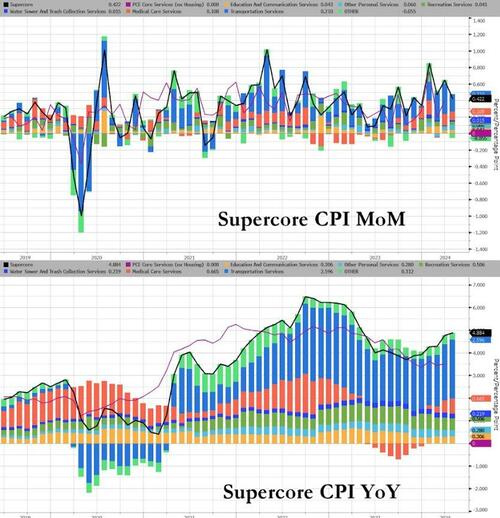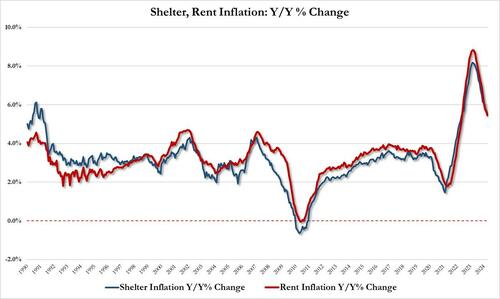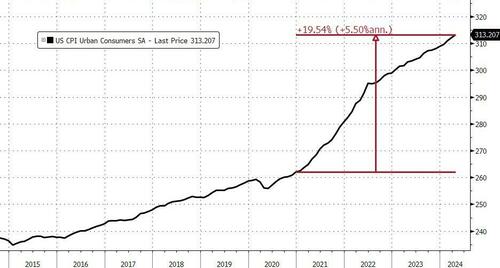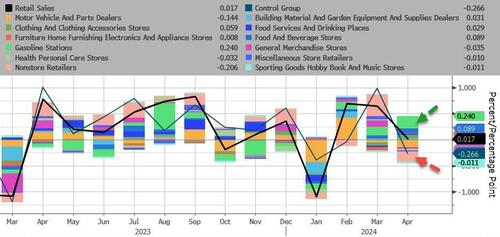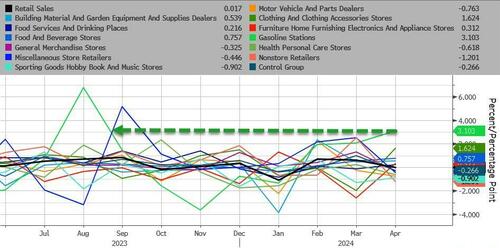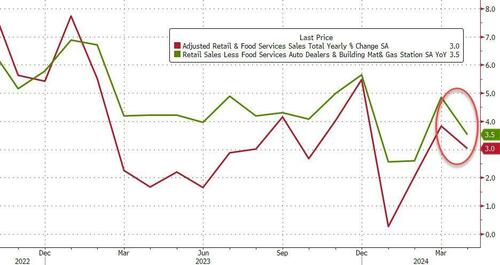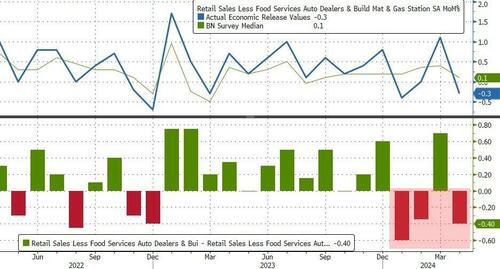Homosexuality is incompatible with the priestly vocation. Otherwise, celibacy itself would lose its meaning as a renunciation.
All
Floods in Afghanistan leave tens of thousands homeless
The death toll reached 300, while the Taliban are unable to report the number of missing. Several residents said they have lost everything, while pneumonia and diarrhoea are spreading among children due to the lack of drinking water. The delivery of aid is complicated by the collapse of bridges and roads. The dry winter made the soil impermeable, causing landslides and flooding.
Bitcoin Paves The Way For A New Era Of Free Market Banking
Bitcoin Paves The Way For A New Era Of Free Market Banking
Tyler Durden
Wed, 05/15/2024 - 13:25
Authored by Nick Giambruno via InternationalMan.com,
Hal Finney was a pioneering computer scientist, cryptographer, and prominent Cypherpunk who played a crucial role in the early development of Bitcoin.
He was one of the first supporters, contributors, and adopters of Bitcoin.
In short, Finney was a visionary who understood Bitcoin’s potential before almost everyone else.
In December 2010, Finney wrote:
“There is a very good reason for Bitcoin-backed banks to exist, issuing their own digital cash currency, redeemable for bitcoins.
Bitcoin itself cannot scale to have every single financial transaction in the world be broadcast to everyone and included in the blockchain.
There needs to be a secondary level of payment systems which is lighter weight and more efficient. Likewise, the time needed for Bitcoin transactions to finalize will be impractical for medium to large value purchases.
Bitcoin backed banks will solve these problems. They can work like banks did before nationalization of currency. Different banks can have different policies, some more aggressive, some more conservative. Some would be fractional reserve while others may be 100% Bitcoin backed. Interest rates may vary. Cash from some banks may trade at a discount to that from others.
I believe this will be the ultimate fate of Bitcoin, to be the ‘high-powered money’ that serves as a reserve currency for banks that issue their own digital cash. Most Bitcoin transactions will occur between banks, to settle net transfers.
Bitcoin transactions by private individuals will be as rare as… well, as Bitcoin based purchases are today.”
Bitcoin banking takes the “free banking” concept and makes enormous improvements.
The free banking era in the US lasted from the 1830s to the early 1860s. Minimal regulations and the absence of a central bank characterized it.
Banks were permitted to issue their own currency, known as banknotes, that circulated as money. These banknotes were supposed to be redeemable on demand for the gold or silver reserves they represented.
The value of these banknotes fluctuated based on the perceived solvency of the issuing bank and the distance from the bank itself, as people were less willing to accept notes from distant or unknown banks.
Similarly, Bitcoin banks hold BTC as a reserve asset and issue digital eCash notes redeemable for Bitcoin (either onchain or on the Lightning Network) anytime on demand. These eCash notes are like digital versions of the gold-backed banknotes during the free banking era, but with several significant improvements.
The best way to think of Bitcoin banking is as a massive upgrade to the existing custodial banking models.
Below are a few benefits.
-
Private transactions
-
Fungibility between different eCash notes
-
Low barrier to entry
-
Minimizing trust
-
Low switching costs
-
Convenient and easy to use
-
Redeemable at any time
-
Backup and recovery of funds
First, we have to understand the basic structure of how a Bitcoin bank could work.
Bitcoin banks are likely to take the form of a federation.
This model reduces trust by distributing control over a group of people or entities. This federated group issues, verifies, transfers, and administers the digital eCash notes—but only if there is consensus among the federation members to take these actions.
The main idea of a federation is that you are reducing the amount of trust needed to run a system by distributing control.
The federation holds its Bitcoin reserves in a multisig wallet, a special type of wallet that requires multiple people’s authorization to spend the funds. Think of it as a safe that requires multiple keys to open.
There will likely be a wide variety of Bitcoin banking federations. Some will be small and focused on local communities, while others will be large and geared towards providing commercial-scale operations.
Naturally, there are risks with any system that depends on trust or third parties.
Bitcoin banks have risks, too, but the main point is that they significantly reduce these risks compared to centralized systems. Specifically, you have to trust that the members of the federation will not form a majority quorum to steal the Bitcoin held in the multisig wallet that backs customer deposits or debase their eCash notes. I’ll discuss these and other risks later.
Here’s how it works.
Someone who wants to obtain eCash notes will first download the software to interact with the federated Bitcoin bank. Then, you will send Bitcoin (onchain or Lightning) to the federated Bitcoin bank and receive eCash notes in return.
With a federated Bitcoin bank, you can also sell something and receive eCash notes in your wallet. You could also earn eCash notes from your employer as they deposit your salary into your wallet, just like they do with your traditional bank account today.
Bitcoin banking federations are meant to be interoperable with the Lightning Network—an open, peer-to-peer network built on Bitcoin that allows for nearly instantaneous transactions and almost zero fees. You can use eCash notes anywhere that Lightning is accepted.
With Bitcoin banking federations, you can withdraw to another federation or your own Bitcoin wallet (onchain or Lightning) anytime on demand.
Unlike self-custody wallets, Bitcoin banking federations can help users recover their funds if they lose access to their wallets.
Suppose you want to spend your eCash with a merchant with a different Bitcoin banking federation. This is where the Lightning Gateways come in. They are market makers who provide liquidity between Bitcoin (onchain and Lightning) and various eCash notes issued by different banking federations for a small fee.
When you send an eCash payment to a merchant at a different banking federation, you will send the eCash to a Lightning Gateway, which will then send the correct eCash to the merchant. Or suppose the Lightning Gateway doesn’t have liquidity in the merchant’s eCash notes. In that case, it will find another Lightning Gateway that does, send that Lightning Gateway a Lightning payment, and then the second Lightning Gateway will forward the payment to the merchant in its eCash note.
In short, Lightning Gateways will provide liquidity that increases the fungibility between numerous eCash notes issued by different Bitcoin banking federations.
It’s like seamlessly sending a payment from PayPal to a user on Cash App, Venmo, or another platform.
If this seems complicated, don’t worry. This just explains how a Bitcoin banking application on your phone would work under the hood. It does all of this in the background without your input. For the user, it will be a seamless experience of simply scanning a QR code and authorizing a payment on a phone application.
Most internet users do not know how TCP/IP or SSL works, but they use it daily in the background as they browse the web. I expect a similar dynamic with Bitcoin, the Lightning Network, federated Bitcoin banks, and various Bitcoin-backed eCash notes.
The graphic below does an excellent job illustrating how transactions with different eCash notes from different federated Bitcoin banks would work. It’s from Eric Yakes, author of The 7th Property: Bitcoin and the Monetary Revolution, which I consider the best resource for understanding the mind-bending potential of Bitcoin banking.
Source: Eric Yakes
Bitcoin Banking and Privacy
Financial privacy is one of the biggest benefits federated Bitcoin banks will offer over traditional custodians.
Chaumian eCash is what will enable it.
The name is a nod to cryptographer and Cypherpunk David Chaum, who created a way to provide secure and anonymous online transactions, much like using cash in the physical world.
With Chaumian eCash, users can spend money online without revealing their identity or transaction details to anyone, including the recipient or the federated Bitcoin banks and Lightning Gateways involved in the transaction.
One of the key features of Chaumian eCash is its use of blind signatures, a cryptographic technique that allows a federated Bitcoin bank to sign and validate eCash notes without actually seeing the transaction details.
In other words, a federated Bitcoin bank knows a valid eCash note has been issued and spent, but it doesn’t know who spent it or on what. Further, they will not be able to know individual account balances nor the identity of those who redeem an eCash note for Bitcoin.
Those running a federated Bitcoin bank will only be able to know the total amount of BTC held in reserves in the federation’s multisig wallet and the total amount of eCash notes outstanding for redemption.
This is a revolutionary improvement in financial privacy over existing custodial solutions, which offer no privacy whatsoever.
The strong privacy protections that Chaumian eCash offers enable another critical benefit: censorship resistance.
With PayPal, Venmo, traditional bank accounts, and other traditional custodial financial services, they can block a payment or cancel your account whenever they want under any pretext they find convenient.
With federated Bitcoin banks, they are unable to censor or block transactions. Thanks to the strong privacy protections from Chaumian eCash, they can’t know the details of each transaction, so they can’t block or prevent them.
In short, with federated Bitcoin banks and Chaumian eCash, we have, for the first time, a convenient custodial solution that is resistant to censorship.
Fedimint
Perhaps the most promising implementation of federated Bitcoin banks is Fedimint.
Fedimint is an open-source protocol that allows anyone to create a federated Bitcoin bank with a few clicks.
Using Fedimint to set up a federated Bitcoin bank costs nothing. No licenses or permission is needed.
In short, Fedimint could do to the banking cartels what Uber did to the taxi cartels.
Rug Pull Risk
Like all Layer 2 solutions, federated Bitcoin banks are a trade-off. They are less secure than self-custody but offer more convenience, ease of use, and privacy, among other benefits.
Specifically, you have to trust that the members of the federation will not collude to form a majority quorum to steal the Bitcoin held in the multisig wallet that backs customer deposits.
The size of that quorum will vary between different federations. The larger the quorum, the more distributed the risk.
It could be as small as a 2-of-3 setup, meaning there are three authorized users, and two are needed to spend the Bitcoin reserves in the federation’s multisig wallet, or as large as a 99-of-100 and anything in between.
Rug pull risk will naturally vary between different banking federations.
Local Bitcoin banking federations could mitigate this risk because known community members would operate them. They would likely suffer serious legal, reputational, and physical consequences for stealing their neighbors’ money.
With larger commercial Bitcoin banking federations, depositors could mitigate this risk with private insurance, rating agencies, and other market solutions.
In any case, ongoing due diligence of federated Bitcoin banks will be important. Depositors will have to do this or find someone to do it.
Centralization Risk
Trusted third parties are centralized vulnerabilities. Governments can capture and coerce them.
This is precisely how governments used the gold standard to bootstrap the fiat currency system into existence.
First, people used physical gold as money. Then, to scale, they necessarily turned to third parties, like banks, that stored gold and issued gold IOUs to facilitate trade. Governments captured those third parties and then gradually removed the gold backing from the IOUs until they were nothing more than confetti. In short, that is how the fiat currency system was born.
Could something similar occur with Bitcoin?
Bitcoin has a great chance of avoiding this fate because of its extreme portability and decentralization.
In the past, government agents could simply show up at a bank and demand they hand over their physical gold reserves to a centralized depository.
Let’s presume government agents would even be able to identify someone running a federated Bitcoin bank.
What could they do?
If the federated Bitcoin bank had been set up with sufficient geographical and political diversification, there’s not much they could have done. They could, at most, detain the one person in their jurisdiction running the federated Bitcoin bank.
Let’s say there was a quorum of 7-of-10, and the other nine federation members were located in different political jurisdictions. The Bitcoin reserves would be safe because the one person the government agents detained could not reach a quorum to spend them. The other nine federation members could then take further defensive measures to ensure the safety of the federation’s BTC.
In short, it would be exponentially more challenging for governments to capture, coerce, and centralize federated Bitcoin banks than it was for them to do the same with banks under the gold standard.
Hal Finney noted that there will likely be a market for the various eCash notes, and their values will fluctuate depending on how the market evaluates their risk. I expect eCash notes with more exposure to riskier jurisdictions to trade a discount to their Bitcoin reserves to reflect this risk.
Remember, with the open-source Fedimint protocol, anyone can easily form a federated Bitcoin bank. This low barrier to entry also helps mitigate the centralization risk.
With the traditional banking system—and banking under the gold standard—the government needs to control a relatively small number of banks and entities. With federated Bitcoin banks, anyone could potentially operate one—permission from a centralized banking cartel is not required.
Here’s the bottom line.
If governments attempted to capture, centralize, and coerce federated Bitcoin banks, I believe it would be a fruitless game of whack-a-mole.
Debasement Risk
There is also a risk that the people running a federated Bitcoin bank could secretly collude to debase their eCash notes.
Consider the example of the bankrupt exchange FTX, which created many more claims to Bitcoin than the actual BTC held in reserve. FTX account holders who thought they owned Bitcoin and did not withdraw were left holding the bag.
I think several factors will mitigate this risk with federated Bitcoin banks.
First, the cost of switching to another federated Bitcoin bank or withdrawing is low and can occur anytime. The ease at which a potential bank run could occur should put fear in the hearts of those attempting any debasement scheme.
I expect other market-based incentives, such as memberships in exclusive clubs for Bitcoin banks with the best reputations and other reputation systems, will help minimize the debasement risk.
The low barrier to entry to creating a federated Bitcoin bank and low switching costs means there will likely be cut-throat competition. If the market suspects a Bitcoin bank is debasing its eCash notes, it will be an excellent opportunity for a competitor to grab market share.
Likewise, speculators could play an important role. They will be there to short the eCash notes of Bitcoin banks suspected of engaging in debasement.
Conclusion
Bitcoin is a revolutionary innovation for the base monetary layer and provides a foundation for a new financial system.
Consider the implications of the trustless Bitcoin base layer in combination with the Lightning Network, federated Bitcoin banks issuing Chaumian eCash, and other trust-minimized Layer 2 solutions for scaling and convenience.
The amount of value they could unlock is astonishing. It could usher in a new era of free banking worldwide.
While the Bitcoin megatrend is no longer in its infancy, it is still early, and you are not too late. Bitcoin has a long way to go before it emerges as the world’s dominant money and displaces the traditional financial system.
I have little doubt The Bitcoin Supremacy will be one of the biggest financial trends of the decade. I believe that patient investors will reap substantial gains.
That’s why I’ve just released an urgent PDF report revealing three crucial Bitcoin techniques to ensure you avoid the most common—sometimes fatal—mistakes.
Check it out as soon as possible because it could soon be too late to take action. Click here to get it now.
The Grain That Feeds The World Is At Risk Of An Upside Breakout
The Grain That Feeds The World Is At Risk Of An Upside Breakout
Tyler Durden
Wed, 05/15/2024 - 13:05
Rice is a staple food for over 3.5 billion people worldwide, especially in Asia, Latin America, and Africa. It's grown in over 100 countries, with 90% of the world's rice produced in Asia. We have been tracking the prices of Thai white rice, which surged to 15-year highs in 2023 and has since consolidated at these highs with risks of a further upside breakout.
According to new data from the Thai Rice Exporters Association, Thai white rice 5% broken, an Asian benchmark, rose nearly 6% to $649 a ton, inching closer and closer to last year's highs. Since early 2022, prices have surged 64%.
We continue to follow Thai rice prices because rice is a critical staple food for billions of people worldwide.
Here are some of the risks we've pointed out in the last few years:
-
Sept. 2022: The Stage Is Being Set For A Massive Global Rice Shortage
-
May 2023: Global Rice Shortage Looms, Set To Be The Biggest In Decades
-
May 2023: Thai Rice Crop In Crosshairs Of El Nino As Farmers Are Warned About Water Shortages
-
July 2023: "So It Begins ": US Supermarkets Hit With Buying Panic As India Bans Rice Exports
-
August 2023: Rice Crisis Sends Prices To Highest Levels Since 2008
-
September 2023: "Go Easy On The Curry": HSBC Warns Rice Crisis Reminiscent Of '2008 Asian Food Price Scare'
-
November 2023: Rice Nears 15-Year High As Global Food Crisis 'Much Worse Than 2008'
The good news is that global food prices measured via the UN's Food and Agriculture Organization print below the 2010 Arab Spring level, an area of risk where high food prices cause social instabilities in third-world countries. However, some of the latest prints show that food inflation could increase.
If prices do surge from here, let's remind readers of this 2008 headline from The Guardian:
Food inflation is certainly not going away. That's evident in the prices of cocoa, OJ, coffee, beef, and many other items at the supermarket.
Venezuela Moves "Substantial Quantities" Of Troops To Guyana Border
Venezuela Moves "Substantial Quantities" Of Troops To Guyana Border
Tyler Durden
Wed, 05/15/2024 - 12:45
By Charles Kennedy of OilPrice.com
Venezuela has moved “substantial quantities of [military] personnel and equipment to the border with Guyana amid its territorial dispute over the Essequibo region.
The update comes from the Center for Strategic and International Studies in Washington D.C., which this week released a report on the latest developments in the Venezuela-Guyana dispute.
The think tank talks about an expansion of a military base on Anacoco Island in the area, with new roads and a bridge getting built in the past few months. A local airport is also being expanded, CSIS also said, citing satellite imagery and social media posts.
According to the report’s authors, the activity could be preparation for a “manufactured crisis” before or after Venezuela’s next elections, set to take place in late July.
The Essequibo region encompasses about two-thirds of Guyana’s territory and is where most of its oil resources lie, and the site of massive discoveries and new production by Exxon and partners.
The International Court of Justice previously ruled that Essequibo is part of Guyana, although this is still not recognized by Venezuela. A written agreement was penned in December between the two that denounced the use of force, instead calling for a commission to address the disputes.
However, after a December referendum, in which Venezuelans overwhelmingly voted that Essequibo is part of their country, the government pushed with its annexation attempt. The buildup of troops began in February this year and prompted expectations of an imminent military conflict.
At the time, Caracas said it had the right to shore up its borders in response to U.S. military exercises in Guyana toward the end of the year and the presence of a UK anti-narcotics vessel that is in Guyanese waters. The Venezuelan government has also criticized Exxon for depending on the U.S. military for its security and for its exploitation of Guyana’s oil resources.
Online prayer in Hong Kong to break the silence 35 years after Tiananmen
While the anniversary of the massacre of the students in Beijing will not take place on 4 June in Victoria Park, a group of individual Christians is calling on people to sign a prayer that will be published as an ad in the Christian Times. The text refers to the repression of that time, but also to the one currently underway in Hong Kong.
Canadian euthanasia doctor giggles about killing.
Alex Schadenberg
Executive Director, Euthanasia Prevention Coalition
Liz Carr is an actress, comedian and disability rights activist produced a documentary titled; Better off Dead? that was aired on May 14 by BBC1.
Executive Director, Euthanasia Prevention Coalition
Carr who is best known for her role as Clarissa Mullery on the BBC series Silent Witness, interviewed Ellen Wiebe, a Vancouver doctor who has committed some of Canada's most controversial euthanasia deaths.
 Ellen WiebeElmira Tanatarova reported for the Daily Mail on May 15 that many of the viewers of the Better off Dead? documentary were uneasy with Wiebe as she giggled when discussing the number her euthanasia deaths. Tanatarova reports:
Ellen WiebeElmira Tanatarova reported for the Daily Mail on May 15 that many of the viewers of the Better off Dead? documentary were uneasy with Wiebe as she giggled when discussing the number her euthanasia deaths. Tanatarova reports:
A Canadian doctor who has personally euthanised more than 400 people has left viewers feeling 'uneasy' as she 'giggled' while discussing the solemn topic with a disability rights campaigner in a new BBC documentary.
Speaking to Liz Carr's programme, Better Off Dead?, Dr Ellen Wiebe, who works with Dying With Dignity, had audiences feeling uncomfortable as she laughed and smiled while discussing assisted death.
'I love my job,' she said in the show, which aired on Tuesday night. 'I've always loved being a doctor and I delivered over a 1000 babies and I took care of families but this is the very best work I've ever done in the last seven years.Wiebe tells Carr that nobody is more grateful than the patients that she has killed. Tanatarova reports some of the comments from the BBC documentary viewers:
 Ellen WiebeElmira Tanatarova reported for the Daily Mail on May 15 that many of the viewers of the Better off Dead? documentary were uneasy with Wiebe as she giggled when discussing the number her euthanasia deaths. Tanatarova reports:
Ellen WiebeElmira Tanatarova reported for the Daily Mail on May 15 that many of the viewers of the Better off Dead? documentary were uneasy with Wiebe as she giggled when discussing the number her euthanasia deaths. Tanatarova reports:A Canadian doctor who has personally euthanised more than 400 people has left viewers feeling 'uneasy' as she 'giggled' while discussing the solemn topic with a disability rights campaigner in a new BBC documentary.
Speaking to Liz Carr's programme, Better Off Dead?, Dr Ellen Wiebe, who works with Dying With Dignity, had audiences feeling uncomfortable as she laughed and smiled while discussing assisted death.
'I love my job,' she said in the show, which aired on Tuesday night. 'I've always loved being a doctor and I delivered over a 1000 babies and I took care of families but this is the very best work I've ever done in the last seven years.Wiebe tells Carr that nobody is more grateful than the patients that she has killed. Tanatarova reports some of the comments from the BBC documentary viewers:
Enjoying her job a little too much I felt,' one wrote.
'She was extremely scary and oddly cheerful,' another added. 'But it might have been defensiveness which made her so very strange indeed.'
'Her eagerness and her excitement over grateful patients was unsettling,' one poster penned.
'Really eerie,' one comment read. 'Her job should bring feelings of solemnity, profoundness, sadness... anything but the weird euphoric state she seems to be in.'The Better off Dead? document gives Wiebe an opportunity to explain her experience with euthanasia. Tanatarova reports:
'We have a law and I obey this law and there are people who are not eligible under the law,' she explained.
'There are situations where I might find somebody not eligible or eligible when another person won't because of the way our law is written.'
Ellen explained that the 'number one reason' people look into assisted death is autonomy.
'Everybody's different in what they think of as autonomy and control,' she added.
'They desperately want control. Like, they want to say "it's now".
'At the end we say "OK well I can get back here at seven o'clock is that ok?" and they'll say yes and they'll be so grateful that they can skip the last two days of their life.
'And I look at it and think all you really needed was some more drugs - but you want my drugs? I'll give them to you.'Wiebe admits that she has killed people who only need "some more drugs" but because they want euthanasia, she kill them.
When commenting on euthanasia for people with disabilities, Wiebe reportedly says:
'I've certainly met people who are no more disabled than I am saying that life is not acceptable in this state,' she explained.
'And I would say "hm, you and I are different". But not different in the sense of wanting to have some control.'Carr then asks Wiebe if she would approve her for euthanasia. Tanatarova reports:
'So Liz right now you love life and you want to live but there's lots of nasty illnesses you might get,' the doctor continued.
'And if you got terminal cancer and you were having to deal with chemotherapy and radiation wouldn't you be thrilled if you had the choice to say "I'll go this far and no further?"'
'For me,' Liz replied. 'I'm concerned that giving the option and the right to a group of people puts another group of people at risk. But I don't feel you see that as a worry.'Tanatarova responds with Wiebe stating:
'She was extremely scary and oddly cheerful,' another added. 'But it might have been defensiveness which made her so very strange indeed.'
'Her eagerness and her excitement over grateful patients was unsettling,' one poster penned.
'Really eerie,' one comment read. 'Her job should bring feelings of solemnity, profoundness, sadness... anything but the weird euphoric state she seems to be in.'The Better off Dead? document gives Wiebe an opportunity to explain her experience with euthanasia. Tanatarova reports:
'We have a law and I obey this law and there are people who are not eligible under the law,' she explained.
'There are situations where I might find somebody not eligible or eligible when another person won't because of the way our law is written.'
Ellen explained that the 'number one reason' people look into assisted death is autonomy.
'Everybody's different in what they think of as autonomy and control,' she added.
'They desperately want control. Like, they want to say "it's now".
'At the end we say "OK well I can get back here at seven o'clock is that ok?" and they'll say yes and they'll be so grateful that they can skip the last two days of their life.
'And I look at it and think all you really needed was some more drugs - but you want my drugs? I'll give them to you.'Wiebe admits that she has killed people who only need "some more drugs" but because they want euthanasia, she kill them.
When commenting on euthanasia for people with disabilities, Wiebe reportedly says:
'I've certainly met people who are no more disabled than I am saying that life is not acceptable in this state,' she explained.
'And I would say "hm, you and I are different". But not different in the sense of wanting to have some control.'Carr then asks Wiebe if she would approve her for euthanasia. Tanatarova reports:
'So Liz right now you love life and you want to live but there's lots of nasty illnesses you might get,' the doctor continued.
'And if you got terminal cancer and you were having to deal with chemotherapy and radiation wouldn't you be thrilled if you had the choice to say "I'll go this far and no further?"'
'For me,' Liz replied. 'I'm concerned that giving the option and the right to a group of people puts another group of people at risk. But I don't feel you see that as a worry.'Tanatarova responds with Wiebe stating:
'And I am so glad, so glad that I'm a Canadian and that we have this law so that people can choose that or not choose that
'But to say that somebody has to suffer like that is simply cruel.'Tanatarova then explains that Wiebe has been involved with some controversial deaths.
Last year, it was reported that Ellen said she helped euthanise a man who was previously deemed unsuitable for assisted suicide.
Speaking in a seminar for physicians working in assisted suicide, she told attendees about the time she treated a patient who did not qualify for the end of life service.
A MAiD assessor had rejected the unnamed man because he did not have a serious illness or 'the capacity to make informed decisions about his own personal health.'
But the man eventually made his way to Ellen, who cleared him, flew him out to Vancouver, and euthanised him, The New Atlantic said.Tanatarova reports on why Liz Carr produced the Better off Dead? documentary:
She told the programme: 'On an everyday basis, disabled people are dealing with a lower expectation and people actually saying to their faces: "Gosh, surely it's better to be dead than be you?"
'That happens. It's shocking. So I wanted that to be the starting point and then let's unravel why that is and how that leads to my fear of legalising assisted suicide.'
The British actress added that 'of course we don't want [a person at the end of their life] to suffer'.
She continued: 'The problem is, actually, a lot of disabled people do suffer. But what they suffer from are the barriers and the obstacles, the fact they have to fight for support, the fact their isn't social care, the fact of attitudes, the fact of lack of access to so many things.
'You know, we do suffer. So don't then make it legal to end that suffering through assisted suicide, that's the fear.'Carr explains that she is treated differently by people who recognize her as an actress compared to those who don't recognize her. Tanatarova reports:
She explained: 'From my gaze, from somebody who lives in a world where, you know, if I'm recognised in the street, then people are giddy and excited and it's wonderful.
'If I'm not recognised in the street, then I'm ignored or sometimes I'm glanced at as I'm just trouble and I'm a problem and: "Oh god, have we got to get the ramp out? Ugh." I'm just a pain.
'So that difference shows me that oftentimes I think disabled people are just tolerated and I think that's the same with ill people and older people, and I think all those groups would be affected by these laws.
'As long as there's that inequality, it is not safe to legalise... no amount of safeguards will prevent us from mistakes and abuse and coercion, that's my belief.'
'But to say that somebody has to suffer like that is simply cruel.'Tanatarova then explains that Wiebe has been involved with some controversial deaths.
Last year, it was reported that Ellen said she helped euthanise a man who was previously deemed unsuitable for assisted suicide.
Speaking in a seminar for physicians working in assisted suicide, she told attendees about the time she treated a patient who did not qualify for the end of life service.
A MAiD assessor had rejected the unnamed man because he did not have a serious illness or 'the capacity to make informed decisions about his own personal health.'
But the man eventually made his way to Ellen, who cleared him, flew him out to Vancouver, and euthanised him, The New Atlantic said.Tanatarova reports on why Liz Carr produced the Better off Dead? documentary:
She told the programme: 'On an everyday basis, disabled people are dealing with a lower expectation and people actually saying to their faces: "Gosh, surely it's better to be dead than be you?"
'That happens. It's shocking. So I wanted that to be the starting point and then let's unravel why that is and how that leads to my fear of legalising assisted suicide.'
The British actress added that 'of course we don't want [a person at the end of their life] to suffer'.
She continued: 'The problem is, actually, a lot of disabled people do suffer. But what they suffer from are the barriers and the obstacles, the fact they have to fight for support, the fact their isn't social care, the fact of attitudes, the fact of lack of access to so many things.
'You know, we do suffer. So don't then make it legal to end that suffering through assisted suicide, that's the fear.'Carr explains that she is treated differently by people who recognize her as an actress compared to those who don't recognize her. Tanatarova reports:
She explained: 'From my gaze, from somebody who lives in a world where, you know, if I'm recognised in the street, then people are giddy and excited and it's wonderful.
'If I'm not recognised in the street, then I'm ignored or sometimes I'm glanced at as I'm just trouble and I'm a problem and: "Oh god, have we got to get the ramp out? Ugh." I'm just a pain.
'So that difference shows me that oftentimes I think disabled people are just tolerated and I think that's the same with ill people and older people, and I think all those groups would be affected by these laws.
'As long as there's that inequality, it is not safe to legalise... no amount of safeguards will prevent us from mistakes and abuse and coercion, that's my belief.'
Previous articles about Liz Carr:
- Liz Carr: I'm fighting for the right to live (Link).
- Better off Dead? documentary to be aired on BBC1 on May 14 (Link).
- Laws against assisted suicide provide equal protection (Link).
- Liz Carr address to Victoria Australia parliament on assisted suicide (Link).
- Disability activists say no to euthanasia bill (Link).
Did Michael Cohen Commit Perjury In The Trump Trial?
Did Michael Cohen Commit Perjury In The Trump Trial?
Tyler Durden
Wed, 05/15/2024 - 10:45
Below is a slightly expanded version of my column in the New York Post on the first day of cross examination for Michael Cohen. He still has one day of cross examination ahead of him on Thursday. With the government resting after Cohen’s cross examination, I believe that an honest judge would have no alternative but to grant a motion for a directed verdict and end the case before it goes to the jury. Judge Juan Merchan will now have to give the full measure of his commitment to the rule of law. Given the failure to support the elements of any crime or even to establish the falsity of recording payments as legal expenses, this trial seemed to stumble through the motions of a trial. Michael Cohen was only the final proof of a raw political exercise. For critics, some of Cohen’s answers appear clearly false or misleading. Like their star witness, the prosecutors have shown that they simply do not take the law very seriously when there is an advantage to be taken. Cohen has truly found a home with the office of Manhattan District Attorney Alvin Bragg.
Here is the column:
On Tuesday, the prosecution surprised many by suddenly announcing that it would rest its case against former president Donald Trump with the completion of testimony by Michael Cohen.
It was surprising because the prosecution never clearly stated the crime that it was proving, the elements of that crime, or even why denoting payments related to Stormy Daniels were not properly recorded as legal expenses.
Indeed, the only thing the prosecutors proved was that, in the pantheon of dishonesty, there are liars, pathological liars . . . and Michael Cohen.
Cohen spent the last two days insisting that he used to be a liar but lied to help former President Donald Trump. If that is the thrust of his testimony, it is just the latest lie told by Cohen under oath.
Cohen has lied to Congress, courts, special counsels, the IRS, the banks, and virtually every creature that walks or crawls on the face of the Earth.
Notably, his past conviction for business and tax fraud were not taken in the interests of Trump but himself.
When he admitted on the stand that he lied during his prior plea agreement, that was not to assist Trump who he had already denounced. It was to advance his own interests.
There is every indication that Cohen is still lying.
Cohen repeatedly said that he could not remember even recent calls after recounting calls from eight years ago with crystal clarity. He said that he could not remember if he leaked information in the case to CNN. However, these paled in comparison to other glaring moments.
Take, for example, his testimony on his unethical decision to secretly record a Sept. 6, 2016 telephone call with Trump.
It was a breathtaking betrayal that most lawyers would not contemplate, let alone carry out.
When asked by the prosecutors about that act, Cohen bizarrely claimed that he did so to guarantee that David Pecker, the former publisher of the National Enquirer, would “remain loyal to Mr. Trump.”
No one seriously believes that this is true. It does not even make sense. Pecker was speaking to Trump about the payments and even met with him at the White House.
Playing for him a call with Trump would produce nothing but confusion rather than pressure for Pecker.
Moreover, why would Cohen tape the call without letting Trump know? The obvious motive was to squirrel away material to use against Trump if he ever needed a little leverage.
Again, it was for Cohen.
Cohen’s testimony showed that he has consistently acted in his sole interest.
After portraying his sudden cooperation with prosecutors as a type of Road to Damascus, jurors learned that all roads lead back to Cohen and his bank accounts.
After telling the jury that he has dedicated his life to righting the wrongs of Trump and holding him accountable, he admitted that he repeatedly acted to undermine the prosecution in order to make a buck.
Told by prosecutors to stop doing public interviews, Cohen did not care. He did roughly two dozen television appearances and recorded hundreds of podcast episodes.
He admitted that Trump is mentioned in virtually every episode, of which he did roughly four a week.
He recounted how he raked in millions on books, including one titled “Revenge.” He admitted that he is selling items like a $32 shirt with a photo of Trump in a jumpsuit behind bars and a coffee mug with the phrase “send him to the big house, not the White House.”
He is also peddling a reality show called “The Fixer,” in which he promises viewers, “I am your fixer.”
After just a few hours of cross examination, it was clear that Cohen is the same grifter saving himself — one Venmo at a time.
Yet, Cohen continued to reframe reality in his own self-constructed image.
When asked about his TikTok antics, he portrayed his postings as a type of sleep deprivation therapy, explaining that “having a difficult time sleeping and [he] found an out.”
No sane prosecutor would rely on Cohen, let alone make him the entirety of their case.
The prosecutors did not even bother to show that Trump was responsible for or knew about how the payments were recorded on ledgers and business records.
They also just shrugged away the need to show why denoting these payments as “legal expenses” was fraudulent — or what the correct description might be.
Those details might be demanded in any other courtroom, but this is New York and the defendant is Donald Trump.
For Bragg and his team, it is all about what they can get out of this case despite the law.
In that sense, they found a kindred spirit in their star witness, and Michael Cohen has finally found a place that values what he calls on his reality show promo his “particular set of skills.”
Hell and Eternal Punishment
Three of the most beautiful things in the Bible are:
Romans 8:38-39
“I am sure that neither death nor life, nor angels, nor principalities, nor things present, nor things to come, nor power, nor heights, nor depths, nor any other thing in creation will be able to separate us from the love of God in Christ Jesus our Lord.”
First Corinthians 13 – possibly the most profound and beautiful passage anywhere, including all philosophy and all literature.
And the story of the Prodigal Son.
Mystery and not knowing or understanding everything is just fine. In fact, it is good and beautiful. People who say things like, “I just don’t understand how free will is possible,” as grounds for not believing in free will, are just annoying. And really they say that because they are committed to materialism as a matter of faith, and materialism and free will do not mix.
It does seem that concerning some moral matters God has not left us in the dark. The assertion that our conscience is a direct link with God seems true, though not infallible. And, one thing our conscience prevents us from doing is being overly punitive and aggressive in our reaction to perceived wrongs. You give me a disparaging look and I burn your house down. Not cool! Avicenna points out that a God who tortured you with scorpions, whips and red hot rods in an act of vengeance for all time would be doing precisely the sort of thing that He forbids us from doing. God the Hypocrite is not an appealing character – Vengeance is Mine or no Vengeance is Mine.
Origen is a truly impressive figure. One can sometimes think, “Yeah, those old guys were smart and everything, but we’ve had a couple of thousand years to think about some of this stuff, so, of course, we’ll have figured more things out.” And then one reads Origen, and realizes, God damn it, he’s got an extremely high level and advanced understanding in the second century AD – no need for 2000 years! And one of the things he had already realized was that a premature introduction to moral truths could be pathological. The moral moron thinks that escaping official state punishment means that no punishment will be forthcoming at all, and that is simply not the case. Telling someone that God is watching you all the time and judging you is not really satisfactory. It is misleading and generates a pretty strange picture of God – very moralistic and judgmental. God the Church Lady. But, most people are pretty stupid on such questions, especially the young, and if that’s what it takes to understand that being a bad person is bad and will be bad for you, then so be it. Everyone’s understanding is imperfect. We can only understand at our own level.
The only reason I do not have an even higher opinion of Origen is that I agree with him too much, so reading him can be a little redundant.
Church doctrine has historically been decided by committees and by voting. It is a truism in philosophy that truth is not democratic. It is not whatever the majority of us think. There was a lot of horse trading, for instance, concerning whether the Book of Revelations was going to be included in the Bible or not. The participants had to make a lot of compromises to get it included and make a lot of concessions – though I cannot remember what those were.
Avicenna says “punishment” is really a pain in one’s soul reflecting our soul’s deficiency. We call this “alienation from God” or being distant from God. Of course, one can never actually be alienated nor distant. “It is in God that with live, and move and have our being.” And “reward” is really pleasure in the soul reflecting our soul’s perfection. We call this being close to God.
Official church doctrine will have to be aimed at the great mass of people, not the Origens and Avicennas. Teaching people that God is not a judge or a king could be corrupting, so they do not. Berdyaev, who of course is completely heretical, regards thinking of God as a judge or king as “sociomorphic:” i.e., we are applying human social categories and concepts completely inappropriately. On Earth, we need judges and kings to rule over us and to protect ourselves from the most predatory humans. In heaven, we don’t need to be so protected – or rather, the protection will be perfect and instantaneous. And, God does NOT protect us from human predators on Earth. In fact, the reward for being the most pious, faithful servant of God can be crucifixion. Human history appears to have no meaning on earth and there is little to no earthly justice. One can only cross one’s fingers that history means something transcendentally and thus serves some divine purpose, otherwise it is just terrible and a travesty.
God has clearly decided in favor of free will. Nuns are not protected from rape nor monks from slaughter. It would be strange that he would leave it up to us whether such things happen, but that he would take a highly interventionist approach to church doctrine. The Great Schism between the Eastern church and the Western church was officially over a relatively minor doctrinal difference. Was one of the churches divinely inspired and the other not? By what method might one choose between them?
How free will functions in heaven seems completely mysterious. It has been claimed that free will is even greater and more dynamic in heaven than on earth. That sounds appealing, but we will have to wait to find out how that actually works.
It would be ironic if being skeptical about eternal punishment was actually grounds for eternal punishment. I like to imagine that even the famous atheist skeptics, the Daniel Dennetts and Bertrand Russells will be forgiven. They will say, “If you really wanted belief and devotion, why did you make it optional? Why did you not provide more definite proof of your existence?” The answer is that only a freely chosen belief and love is worth anything. But, as Nietzsche stated, to destroy the poorly constructed pots and lids and to seek vengeance upon them, those same pots and lids that you made, is a sin against good taste. Much as I don’t like them, I’m hoping that the Dennetts and Russells end up saying, “Well, don’t I feel like an idiot.”
There are plenty of moral questions about which I am perplexed, but proportionality, redemption, atonement and forgiveness are not among them. I used to think that when one gets to heaven one could ask God, “Did I do the right thing that time?” And He would answer. Now, I suspect that He might say, “I don’t know. What do you think?”
Pope prays for Afghanistan, urges the international community to provide aid
Francis pleads for peace again during this Wednesday general audience. Calling for a 'definitive peace', he slammed war, which 'is always a defeat. Always.' He also mentioned "tormented Ukraine", Palestine, Israel, Myanmar, and 'all peoples who suffer war". Charity is the focus of his weekly catechesis, 'for those who are not lovable, [. . .] even for one's enemy.'
WTI Rebounds Off Lows After Across-The-Board Inventory Draws
WTI Rebounds Off Lows After Across-The-Board Inventory Draws
Tyler Durden
Wed, 05/15/2024 - 10:39
Oil prices are tumbling this morning despite lower CPI (juicing rate cut hopes), weak retail sales (but strong gas station spending), and a big draw reported overnight by API. It seems the main downside driver was IEA lowering its 2024 demand forecast.
-
World oil demand is forecast to grow by 1.1 million barrels per day this year, down 140,000 bpd from last month's projection.
-
Global crude inventories surged in March by 34.6 million barrels as trade disruptions pushed oil on water to a post pandemic high, according to the IEA.
The question is - will the official data confirm API's big crude draw and re-energize prices.
API
-
Crude -3.1mm (-1.1mm exp)
-
Cushing -601k
-
Gasoline -1.27mm (unch exp)
-
Distillates +349k (+300k exp)
DOE
-
Crude -2.508mm (-1.1mm exp)
-
Cushing -341k
-
Gasoline -235k (unch exp)
-
Distillates -45k (+300k exp)
The official data shows inventory draws across the board with crude stocks down 2.5mm barrels...
Source: Bloomberg
The Biden admin continued to add to the SPR, adding 593k barrels...
Source: Bloomberg
US Crude production remains flat near record highs at 131.mm b/d...
Source: Bloomberg
WTI was trading just above $77 ahead of the official print and rallied further on the across-the-board draws...
Finally, we note that refinery utilization rates are back above 90%, the highest since January. Rates increased in all regions, with the Midwest rising for the second straight week to 90.8%, from 85.2% in the previous week, as refineries wake up from maintenance.
First ATM, Now Debt-For-Equity Swap, AMC Drains Equity In Bid To Stay Alive
First ATM, Now Debt-For-Equity Swap, AMC Drains Equity In Bid To Stay Alive
Tyler Durden
Wed, 05/15/2024 - 10:05
Volatility in "meme stocks" continued in premarket trading on Wednesday as AMC Entertainment Holdings announced a debt-for-equity exchange for $163.9 million in bonds maturing in 2026. This strategy mirrors management's approach that helped the struggling movie theater chain capitalize on retail day traders to boost liquidity in 2021.
A regulatory filing released Wednesday morning detailed how AMC reached a deal to swap about $164 million of its 10% notes due 2026 for 23.3 million shares of newly issued stock. The new stock is valued at $7.33 per share.
"AMC, much of whose debt trades at distressed prices, has been chipping away at its maturities through other swaps and buybacks. It exchanged around $200 million of the debt for shares last year," Bloomberg pointed out.
Today's news sparked a rally in AMC's high-yield bonds. The company has over $2.5 billion in outstanding bonds, most of which will mature in 2026.
News of the added supply sent shares down nearly 9% in premarket trading to the low $6 handle.
Shares were as high as $11.48 early Tuesday in the multi-day meme stock mania, triggered by a post on X from Roaring Kitty, also known as Keith Gill, on Sunday night.
Also, on Tuesday, AMC completed a previously disclosed ATM. The deal was completed through Citigroup Global Markets, Barclays Capital, B. Riley Securities, and Goldman Sachs & Co., raising about $250 million in new capital for the struggling company.
The old saying goes, "Strike while the iron is hot." That's precisely what AMC's management is doing: taking advantage of retail day traders by completing ATM and debt-for-equity exchanges. Somehow, this company, which should've been dead a long time ago, continues to stay alive with help from day traders.
Maintaining the Façade
Programming note: Tomorrow, Thursday, the evening repeat of Steyn's Song of the Week airs on Serenade Radio at 9pm BST - that's 4pm North American Eastern. You can listen from almost anywhere on the planet by clicking the button at top right here. The
California and New York Are Even Shaking Down Fleeing Residents
Even though people are leaving California and New York in droves due in large part to their ruinous taxes, the state authorities are tracking these emigrants down and demanding they continue to pay state taxes. Right out of Orwell.
Live Around the Planet: Wednesday May 15th
Mark takes questions from Steyn Club members around the world...
"Trifecta Of Dovish News... Consistent With Fed Cutting In September": Wall Street Reacts To Weaker CPI Print
"Trifecta Of Dovish News... Consistent With Fed Cutting In September": Wall Street Reacts To Weaker CPI Print
Tyler Durden
Wed, 05/15/2024 - 09:51
With the CPI report came in on top of expectations on 3 of the 4 closely watched metrics, with just headline CPI coming in at 0.3%, just shy of the 0.4% expected (with the retail sales print coming in far uglier and missing across the board), there has been some debate among the usual commenting suspects whether this inflation report was enough to tip the scales to an earlier rate cut or not, although the consensus seems to suggest that the print was enough to keep September, if not the July, FOMC meeting in play for a rate cut.
Below we quote some of the most active Wall Street economists and strategists who have already manged to sneak in a bullet point or two with their kneejerk response to the CPI print.
Neil Birrell, CIO at Premier Miton Investors:
“The usual excitement over US inflation ended up being a damp squib, as it came in exactly as expected. However, retail sales were weaker than expected and the core rate is back to levels not seen for quite some time, which might well see optimists calling for rate cuts and markets rallying.”
Capital Economics
"Core CPI was even better than it looked, particularly given that we already know the PPI components that feed into the Fed’s preferred PCE deflator measure came in, on balance, weaker than expected. We estimate that core PCE increased by around 0.20%m/m. All things considered, this is consistent with the Fed cutting interest rates in September."
David Russell, Global Head of Market Strategy at TradeStation
"Shelter didn’t ease as hoped, but there was improvement in transportation and healthcare. The number wasn’t perfect, but we’re staggering toward lower inflation. Weaker data on retail sales and the Empire Index also suggest growth is slowing, which keeps rate cuts on the table. It was a trifecta of dovish news."
Nick "Nikileaks" Timiraos, WSJ resident Fed leaker:
"One good print can't offset three unfavorable ones. It may take a couple more for officials to get over the PTSD of the Q1 inflation. It reduces the risk of any shift to a neutral bias (ie, open the door to hikes)."
Florian Lepo, Lombard Odier Asset Management
“With this in-line inflation print, rates are likely to break the [4.4%] level, dragged down by real rates. With that, the dollar should fall, supporting most assets labeled in it.”
Rubeela Farooqi, chief US economist at High Frequency Economics:
“Overall, price pressures remain elevated but are moving in the right direction. We think the data support the case for a patient approach on policy decisions from the Fed going forward although the base case remains one of lower rates this year.”
Gregory Faranello, head of US rates for AmeriVet Securities:
“Fed friendly data for the most part with both the CPI and retail sales. Both indicate a tempering which is what the Fed is looking for. These numbers support Chair Powell’s notion of ‘higher for longer’ to potentially lower.”
Ira Jersey, head of rates at Bloomberg
“The relief-rally knee-jerk reaction may be more about retail sales slowing meaningfully than the close-to-expected CPI. Sales have tended to lead goods CPI by a few months. The CPI report being pretty close to consensus underlines the continuing trend of lower-volatility core CPI sectors contributing nearly 4% on a year-on-year basis, while higher-volatility ones (right now generally goods sectors) contribute nothing. So although the data was broadly in line, inflation continues to run above the Fed’s comfort level, meaning near-term rate cuts aren’t likely.”
Source: Bloomberg
Consumer Prices Have Risen Every Month Since 'Bidenomics' Began, Up 19.5% To Record High
Consumer Prices Have Risen Every Month Since 'Bidenomics' Began, Up 19.5% To Record High
Tyler Durden
Wed, 05/15/2024 - 09:41
After a fourth straight month of hotter than expected PPI, analysts' expectations for CPI were tightly ranged around 0.3-0.4% MoM and printed +0.3% MoM (slightly below the 0.4% expected). The YoY headline CPI fell to +3.4% as expected from +3.5% prior
Source: Bloomberg
Under the hood, Services slowed modestly MoM...
On a 3m and 6m annualized basis, Energy costs are reaccelerating most...
Source: Bloomberg
Used car and truck prices along with Gas Utility prices plunged on a MoM basis...
Core CPI rose 0.3% MoM (as expected) with YoY slowing to +3.6%, also as expected...
Source: Bloomberg
Core goods deflation continues while Core Services continue to rise...
Source: Bloomberg
Core CPI YoY was 3.6% in April, the lowest it's been in 3 years. The 1-month annualized fell to the same 3.6% as the YoY, which is why the YoY has been more reliable as a trend measure recently.
-
Housing (rent and OER) contributed 17.5 bps to monthly core CPI inflation in April. While still hot (2018-19 average was 11 bps), it's the lowest monthly contribution since Dec 2021. And as we show in the chart, YoY housing in CPI is cooling.
-
Virtually all of the excess core CPI inflation YoY--the part of inflation above and beyond Fed target - resulted from housing & auto insurance. Core non-housing services have heated up on a higher frequency basis but haven't weighing much (yet) on the annual print.
-
Also, while not in core, but extremely important for anyone who eats food: grocery prices actually fell -0.2% MoM in April and are running 1.1% YoY according to the Biden BLS. We doubt anyone will believe this number, which was goalseeked so that wage growth would strongly outpace grocery inflation. Relative to wages, grocery prices are back down below their 2019 levels. This, too, won't be believed by anyone.
And one step deeper - the so-called SuperCore: Core CPI Services Ex-Shelter index - rose 0.5% MoM up to 5.05% YoY - the hottest since April 2023...
Source: Bloomberg
Under the hood of SuperCore CPI, Education costs rose (to pay for cleaning up all those protests?) and Transportation Services dominated on a YoY basis...
Source: Bloomberg
And while Shelter costs rose on a MoM basis, they continues to slow on a YoY basis...
Source: Bloomberg
Goods prices are deflating at the fastest pace since April 2004, while Services prices are stuck around +5.3% YoY...
Source: Bloomberg
We note that consumer prices have not fallen in a single month since President Biden's term began (July 2022 was the closest with 'unchanged'), which leaves overall prices up over 19.5% since Bidenomics was unleashed (compares with +8% during Trump's term). And prices have never been more expensive...
Source: Bloomberg
That is an average of 5.5% per annum (more than triple the 1.9% average per annum rise in price during President Trump's term).
Finally, and most notably it was a miss... but not for the reason expected...
It was a miss but not for the reason expected: OER catch down STILL to kick in; next few CPI print will be a dovish meltdown https://t.co/w1px0HrJN0
— zerohedge (@zerohedge) May 15, 2024Which means the next few months CPI will be even bigger misses...
A Nanny State Idiocracy: A Tale of Too Many Laws and Too Little Freedom
We are caught in a vicious cycle of too many laws, too many cops, and too little freedom.
It’s hard to say whether we’re dealing with a kleptocracy (a government ruled by thieves), a kakistocracy (a government run by unprincipled career politicians, corporations and thieves that panders to the worst vices in our nature and has little regard for the rights of American citizens), or a Nanny State Idiocracy.
Whatever the label, this overbearing despotism is what happens when government representatives (those elected and appointed to work for us) adopt the authoritarian notion that the government knows best and therefore must control, regulate and dictate almost everything about the citizenry’s public, private and professional lives.
The government’s bureaucratic attempts at muscle-flexing by way of overregulation and overcriminalization have reached such outrageous limits that federal and state governments now require on penalty of a fine that individuals apply for permission before they can grow exotic orchids, host elaborate dinner parties, gather friends in one’s home for Bible studies, give coffee to the homeless, let their kids manage a lemonade stand, keep chickens as pets, or braid someone’s hair, as ludicrous as that may seem.
As the Regulatory Transparency Project explains, “There are over 70 federal regulatory agencies, employing hundreds of thousands of people to write and implement regulations. Every year, they issue about 3,500 new rules, and the regulatory code now is over 168,000 pages long.”
In his CrimeADay Twitter feed, Mike Chase highlights some of the more arcane and inane laws that render us all guilty of violating some law or other.
As Chase notes, it’s against the law to try to make an unreasonable noise while a horse is passing by in a national park; to leave Michigan with a turkey that was hunted with a drone; to refill a liquor bottle with different liquor than it had in it when it was originally filled; to offer to buy swan feathers so you can make a woman’s hat with them; to enter a design in the Federal Duck Stamp contest if waterfowl are not the dominant feature of the design; to transport a cougar without a cougar license; to sell spray deodorant without telling people to avoid spraying it in their eyes; and to transport “meat loaf” unless it’s in loaf form.
In such a society, we are all petty criminals.
In fact, Boston lawyer Harvey Silvergate estimates that the average American now unknowingly commits three felonies a day, thanks to an overabundance of vague laws that render otherwise innocent activity illegal and an inclination on the part of prosecutors to reject the idea that there can’t be a crime without criminal intent.
The bigger the government grows, the worse the red tape becomes.
Almost every aspect of American life today, including the job sector, is now subject to this kind of heightened scrutiny and ham-fisted control.
Whereas 70 years ago, one out of every 20 U.S. jobs required a state license, today, almost 1 in 4 American occupations requires a license.
According to business analyst Kaylyn McKenna, more than 41 states require that makeup artists be licensed. Twenty-eight states require a license before you can work as a residential painter. Funeral attendants, whose duties include placing caskets in visitation rooms, arranging flowers and directing mourners, have to be licensed to do so in Kansas, Maine and Massachusetts.
The problem of overregulation has become so bad that, as one analyst notes, “getting a license to style hair in Washington takes more instructional time than becoming an emergency medical technician or a firefighter.”
This is what happens when bureaucrats run the show, and the rule of law becomes little more than a cattle prod for forcing the citizenry to march in lockstep with the government.
Overregulation is just the other side of the coin to overcriminalization, that phenomenon in which everything is rendered illegal, and everyone becomes a lawbreaker.
As policy analyst Michael Van Beek warns, the problem with overcriminalization is that there are so many laws at the federal, state and local levels—that we can’t possibly know them all.
“It’s also impossible to enforce all these laws. Instead, law enforcement officials must choose which ones are important and which are not. The result is that they pick the laws Americans really must follow, because they’re the ones deciding which laws really matter,” concludes Van Beek. “Federal, state and local regulations — rules created by unelected government bureaucrats — carry the same force of law and can turn you into a criminal if you violate any one of them… if we violate these rules, we could be prosecuted as criminals. No matter how antiquated or ridiculous, they still carry the full force of the law. By letting so many of these sit around, just waiting to be used against us, we increase the power of law enforcement, which has lots of options to charge people with legal and regulatory violations.”
Case in point: in New Jersey, in what journalist Billy Binion describes as “yet another example of the effects of overcriminalization, which increases interactions between civilians and police with little benefit to actual public safety,” police went so far as to arrest a teenager and seize other teen’s bicycles for so-called traffic violations and a failure to register their bikes with the state.
This is the police state’s superpower: it has been vested with the authority to make our lives a bureaucratic hell.
“Such laws,” notes journalist George Will, “which enable government zealots to accuse almost anyone of committing three felonies in a day, do not just enable government misconduct, they incite prosecutors to intimidate decent people who never had culpable intentions. And to inflict punishments without crimes.”
This is what happens when the American people get duped, deceived, double-crossed, cheated, lied to, swindled and conned into believing that the government and its army of bureaucrats—the people we appointed to safeguard our freedoms—actually have our best interests at heart.
As I make clear in my book Battlefield America: The War on the American People and in its fictional counterpart The Erik Blair Diaries, the problem with these devil’s bargains is that there is always a catch, always a price to pay for whatever it is we valued so highly as to barter away our most precious possessions.
In the end, such bargains always turn sour.
Reprinted with permission from Rutherford Institute.
Despite Surging Gasoline Spending, US Retail Sales Missed Big In April
Despite Surging Gasoline Spending, US Retail Sales Missed Big In April
Tyler Durden
Wed, 05/15/2024 - 09:39
For once, BofA's analysts 'missed' as their expectations for a small beat in retail sales was eviscerated by a huge miss across the board.
Headline Retail sales were unchanged MoM (versus +0.4% exp) and last month's +0.7% MoM move was revised slightly lower to +0.6% MoM.
Source: Bloomberg
Nonstore retailers and Motor Vehicle and Parts Dealers saw the biggest MoM declines while spending at Gasoline Stations rose the most (biggest MoM rise since Aug 2023)...
Source: Bloomberg
Both headline and core retail sales slowed on a YoY basis (ex-Autos and Gas Stations actually declined 0.1% MoM)...
Source: Bloomberg
Finally, the crucial core-control group - used in GDP calculation - plunged by 0.3% MoM (vs +0.1% MoM exp) - its third big miss in the last four months...
Source: Bloomberg
Not a good start for Q2 GDP.
Who tried to pull the rug on Netanyahu, and why?
The core issues at the heart of release of hostages held in Gaza were two: A complete cessation to the war and full withdrawal of all Israeli forces.
Netanyahu’s position was that whatever the hostage outcome, the IDF would return to Gaza and that the war there might continue for ten years, he said.
These were the most sensitive words in Israeli politics – with Israeli politics electrically polarised around them. The continuation or fall of the Israeli government could hinge on them: The Right had warned that they would quit the government unless the invasion of Rafah were green-lighted; the Biden position, however, was communicated to Netanyahu by phone as not just “no Rafah light,” but rather, “Rafah zero.”
Then these explosive words – cessation of military operations and complete Israeli withdrawal – burst forth in the final text as agreed by the mediators in Cairo; and subsequently in Doha, on Monday, taking Israel by complete surprise. CIA Chief Bill Burns had represented the US in both sessions, but Israel had chosen not to send a negotiations team.
Multiple Israeli sources confirm that the Americans gave no “heads up” of what was coming: Hamas announced the bombshell agreement; Gaza erupted in victory celebrations, and huge protests besieged the government in Jerusalem, demanding acceptance of the Hamas terms. It was tense. There was a whiff of civil war to the huge protests.
The Israeli government alleges that it was “played” by the Americans (i.e. by Bill Burns). It was. But to what end? Biden was adamant that a Rafah incursion must not proceed. Was this Burns’ means to achieving that objective? Using “sleight of hand” in the negotiations (inserting the “red-line” words) into the text without telling Tel Aviv in order to get to “yes” from Hamas? Or was it to precipitate a change of government in Israel? Its policy on Gaza whas beenas imposing a very heavy election campaign toll on the Democratic Party.
In any event – after the Hamas bombshell announcement – the IDF went “Rafah light”, taking the empty Philadelphia corridor (in breach of the Camp David Accords), incurring few casualties, but keeping Netanyahu’s government intact.
Maybe the little deception “to get Hamas to ‘yes’” was viewed in Washington as a clever ploy – but its consequences are uncertain: Netanyahu and the Right will share dark suspicions about the US role. Washington has shown itself (in their view) as an adversary. Will this episode make the Right more determined; less ready to compromise?
In this context, the base division within current Israeli politics is salient. A small plurality of Israelis (54%) believe that there is legitimacy in comparisons between the holocaust and the events of 7 October. And we can see that the conflation of Hamas with the Nazi party is increasingly common amongst Israeli (and US) leaders – with Netanyahu describing Hamas as “the new Nazis.”
Whether we agree or not, what is being said here through this categorisation is that a plurality of Israelis harbour existential fears that the gathering storm surrounding them is the start to a “new holocaust” – which, in turn, implies that the “Never Again” amorphism translates into a binary kill or be killed injunction (drawing on Biblical texts for Talmudic validation).
To understand this is to understand why those few words inserted into the negotiation proposal were so explosive. They implied (in the view of half of Israelis) that they would have no option but to “live” or “die” under the threat of renewed holocaust (with Hamas predominant in Gaza and Hizbullah in the north).
The other portion to Israeli opinion is less apocalyptic: They believe that some return to Occupation and the status quo ante might be possible, especially were the US to succeed in persuading Arab States – jointly with Israel – to eliminate Hamas from Gaza, and to agree to police a de-militarised and de-radicalised Strip.
Cynically viewed, perhaps the practice of “mowing the lawn” (as the periodic IDF incursions to kill militants are euphemistically known) might be less frightening than the notion for Israelis of having to fight an existential war. In this context, 7 October would be viewed as an outsized “lawn mow,” but not something requiring a more radical shift of Life-Style.
That the representatives of this current in the Israeli War Cabinet did not resign from government on learning of Netanyahu’s subsequent rejection of the Hamas proposal – may be connected to the fact that Saudi normalisation with Israel is now not in prospect – Saudi normalisation being the pillar from which some return to the status quo ante might be achieved.
All of which calls into question the motive of War Cabinet members who call for Israel to accept Hamas’ terms. Whilst empathy for hostage families is understandable, it does not address the underlying crises – beyond wishful thinking about the Arab world joining together in an anti-Iranian unity, and digging Israel out from its occupation conundrum.
This might give consolation to the White House facing its own electoral difficulties, but it is hardly a sustainable strategy.
The Hamas agreement bombshell likely has fed into two other factors that are colouring sentiment in Israel: Netanyahu, renowned for his political soothsaying, and holding up his intuitive finger to the wind, detects, he says, the Israeli electorate sliding to the Right. He is becoming more confident that he can win the next Israeli general election.
The first factor is the student protests unfolding across the West; and the second is the threat that the ICC might issue arrest warrants for the PM and other prominent leaders.
David Horovitz, the editor of Times of Israel, writes that:
the underlying goal of the encampments and marches at Columbia, Yale, NYU and the other campuses is to render Israel indefensible — in both senses of the word – and thus deprive Israel of the diplomatic and military means to survive the ongoing effort at its destruction – as effected by Iran and its allies and proxies. At the root of this strategy is, of course, the oldest of hatreds.
In other words, Horovitz is identifying a majority of the student protestors not so much as having human empathy for the plight of Gazans, but as being purveyors “soft-power” holocaust. Horovitz concludes that “if those enemy states, terrorist armies and their facilitators get done with Israel – they’ll be coming for Jews everywhere.”
The last element concerns the putative arrest warrant being issued by the ICC. Netanyahu has a huge ego, perhaps more than most politicians; yet there is no doubt that in spite of the anger directed at him for the errors of 7 October, he is indisputably the standard-bearer for that segment of the Israeli electorate that believes – like Horovitz – that Israel is facing a concerted effort to destroy the Zionist state.
The arrest warrant, therefore, is perceived as more than just an attack on an individual, but more as a part of that wider effort (per Horovitz) to misrepresent Israel and to deprive it of the diplomatic means to defend itself.
Needless to add that this is not the view across the rest of the world – yet it serves to point out how inward-looking, how isolated and fearful the Israeli public is becoming. These are warning signs. Desperate people do desperate things.
The reality is that Israel has attempted to establish a late-era settler-colonisation on lands with indigenous population. The first phase of revolt versus colonialism errupted in the post-WW2 era. We are now living the second stage of global radical anti-colonial sentiment (manifesting strategically as BRICS), but targeting today financialised colonialism posing as the “Rules-Based Order.”
Israelis habitually hang out two flags on special occasions: The Israeli flag and next to it, the US flag. “We are American too: We are the 51st state,” Israelis would say.
“No,” the young American generation of today says: We will not identify with suspect genocidal tendencies against an indigenous people.
No wonder some of the ruling élites are desperate to outlaw the critical narratives. If Israel is the target today, might tomorrow the narratives be critiquing Washington’s facilitation of colonial massacre? Did they (the Biden Team), perchance, toy with pulling the rug from under Netanyahu – to preserve the status quo in Israel a little longer (until at least after the US Elections)?
Reprinted with permission from Strategic Culture Foundation.
American Postcards (Hunting for Trousers)
I yesterday visited a Houston shopping mall to purchase a pair of trousers. It is a large mall in a prosperous district, but it feels empty and past its prime.
Adjacent to the food-court is a large and splendid carrousel or merry-go-round. When this carnivalesque contraption revolves, recorded calliope music plays. It is revolving as I pass, and on it revolves one mother and her child. South Asian by appearance. The operator and ticket-taker is an old white man. He slumps, as old men generally slump, in a frugal straight-backed chair. He wears a paper respiration mask, the fit unsuited to filtration. I reflect that retirement is for many old white men penurious, boring, lonely, and slightly mad.
A sign beside the carrousel reminds mall patrons that they are not allowed to carry weapons on premises. It helpfully provides the examples of guns and knives. I think of hand grenades. The sign admonishes scofflaws that the mall is patrolled by weapon-sniffing dogs.
Outside the restrooms there is what might be called a lounge. It is furnished with large and heavily upholstered easy-chairs that, for a fee, will prod and vibrate a customer’s back and buttocks. Two of these chairs are occupied by androgynes who appear to have come from Sumatra or the Celebes. They have not paid the fee to set the chairs in motion but are engrossed by their cell-phones.
A sign at the entrance to a jeweler advertises engagement rings. It is illustrated with a photograph of masculine black hands slipping one such ring onto a dainty white finger. Shoppers are not numerous, but more than one promenading couples could have modeled that photograph.
The haberdasher’s clerk sports a topknot or “man-bun.” He shakes his head (and topknot) sadly when I point to the trousers I am wearing and ask for another pair just the same. He suggests an alternative that resembles the trousers I am wearing insofar as it has a zipper and two legs. This clerk is not kempt or knowledgeable, but he has yet to affect the hauteur to which haberdasher’s clerks are prone.
A sign in the show window of a clothier that caters to youth encourages all who read it to “choose your own color.” The slogan is illustrated with a rainbow and explained in a paragraph that advertises the clothier’s broadmindedness on questions of sex and sexuality.
Through the show window of a tattoo parlor I see a woman reclined in what looks like a barber’s chair with gynecologist’s stirrups. The attending tattooist is intent, like a jeweler fixing a watch. Two small children play on the floor.
I purchase an ordinary short-sleeved shirt for sixty-four dollars, nervously thinking that I may soon need to supplement the income of my looming retirement with the salary of a carrousel operator, or perhaps a tattooist.
Two young women who have made themselves up to look as if they do not wash give squeals of delight and dive into a shop that supplies young women like that.
The entrance to a department store is serrated with sensors that detect exiting shoplifters. Just inside this mercantile maw there is the usual perfumery, and over the perfumery counters are the usual posters of gorgeous gals. One appears to be snarling and about to bite. Another appears to be experiencing an orgasm. Yet another appears to be astonished by a question she cannot answer. There is no one at or behind the counters. There are, however, countless amber vials bathed in light, encased by glass.
A perfectly symmetrical splatter of creamed coffee decorates the white tiles of an aisle in menswear. This reminds me of the Big Bang, or rather of illustrations of the Big Bang. I am wearing tried-on trousers and am in stocking feet, so I step around it. Why do wives wander off when their men try on trousers? Why do husbands stay put under parallel circumstances? These deep questions take my mind off the Big Bang and the sadness of old age.
A man in the adjacent fitting-room cubicle is talking loudly on his cell phone. He informs his friend (and me) that he is about to fly to Japan and get drunk on sake-bombs.
I settle on trousers that will suffice.


